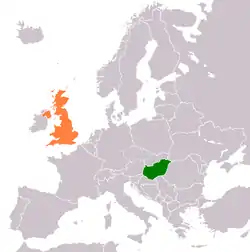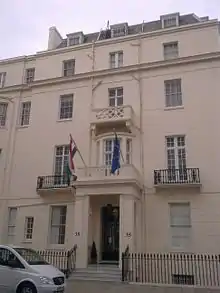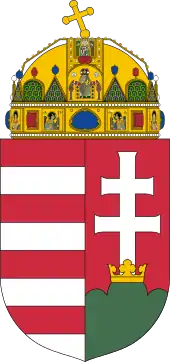Hungary–United Kingdom relations
British–Hungarian are foreign relations between Hungary and the United Kingdom. Hungary was a part of the Austrian Empire until 1918 when it became independent. Both countries established diplomatic relations in 1920. Both countries are full members of NATO.
 | |
Hungary |
United Kingdom |
|---|---|
History
During the early 18th century Hungary was little-known in Britain, and its reputation was negative. That steadily changed as travelers reported on the progress in that distant land. [1] British observers saw Hungary as both a country and a province. However the Russian invasion of 1849 caused an outpouring of sympathy for Hungary as a victim. By 1900 British observers saw Hungary as an integral part of the Austro-Hungarian empire.[2]
From 1848 to 1914 the status of Hungary played a minor role in British diplomacy.[3] London's main goal was the peaceful maintenance of the balance of power. It called for a satisfied and stable Hungary to counterbalance Russia and the Slavs residing within the Habsburg Empire. British sympathies toward Hungary did not extend to the recognition of Hungarian independence from Habsburg rule. The Hungarian Revolution of 1848 under Lajos Kossuth gained strong support across Britain in 1848–1851. [4] However Kossuth's calls for independence from the Austrian Empire did not become British policy. Foreign Secretary Lord Palmerston told Parliament the Britain would consider it a great misfortune to Europe if Hungary became independent. He argued that a united Austrian Empire was a European necessity and a natural ally of Britain.[5] Liberal reformers in Hungary closely watched Britain as a model for the sort of parliamentary government they were seeking. They were especially attracted to the British free-trade movement. They outwitted reactionary censorship. Under the pretext of criticizing British conditions, they agitated in favor of a change in feudal Hungary. [6] [7]
In 1924 the Bank of England reached agreement with the Royal Hungarian Note Institution. Britain financed Hungary's reconstruction and reentry into European commerce. This represented a major expansion of the foreign relations of both nations, and was part of a British effort to forestall inroads into Europe from New York banks.[8]
Resident diplomatic missions
- Hungary has an embassy in London and a consulate-general in Manchester.
- United Kingdom has an embassy in Budapest.
 Embassy of Hungary in London
Embassy of Hungary in London.jpg.webp) Embassy of the United Kingdom in London
Embassy of the United Kingdom in London
Notes
- G. F. Cushing, "Eighteenth century Hungary through British eyes," New Hungarian Quarterly (1979) 20#74 pp 151-165.
- Evans, (2003).
- G. Jeszenszky, "The Hungarian Question In British-Politics, 1848-1914." New Hungarian Quarterly 26#100 (1985): 162-170.
- Zsuzsanna Lada, "The Invention of a Hero: Lajos Kossuth in England (1851)." European History Quarterly 43.1 (2013): 5-26.
- Klari Kingston, "Gunboat liberalism: Palmerston, Europe and 1848 " History Today 47.2 (1997): 37-43 at p 41
- Urbán, (1980)
- Haraszti, (1961).
- Péteri, (1984):
Further reading
- Bán, András. Hungarian-British Diplomacy, 1938-1941: The Attempt to Maintain Relations (Psychology Press, 2004).
- Bátonyi, Gábor. Britain & Central Europe, 1918-1933 (1999) 240pp
- Bridge F. R. Great Britain and Austria-Hungary 1906-14 (1972).
- Evans, R. J. W. "Hungary in the Habsburg Monarchy in the nineteenth century: The British dimension." Hungarian Quarterly 44.171 (2003) pp p111-121..
- Haraszti, É. H. "Contemporary Hungarian Reactions to the Anti-Corn Law Movement." Acta Historica Academiae Scientiarum Hungaricae 8.3/4 (1961): 381-403 online.
- Haraszti, Éva H. "British Reflections on the Decisive Year of Post-War Hungary: 1948." Acta Historica Academiae Scientiarum Hungaricae 27.1/2 (1981): 189-204 online.
- Jeszenszky, G. "The Hungarian Question in British-Politics, 1848-1914." New Hungarian Quarterly 26#100 (1985): 162–170.
- Laszlo, Peter, and Martyn Rady, British-Hungarian Relations Since 1848 (2004), 366pp.
- Macartney, C. A. Hungary, a Short History (1962) online
- Max, Stanley M. United States, Great Britain & the Sovietization of Hungary, 1945-48 (1985), 195pp.
- Meszerics, Tamás. "Undermine, or bring them over: SOE and OSS plans for Hungary in 1943." Journal of Contemporary History 43.2 (2008): 195–216. SOE was British and OSS was American; they barely cooperated. online
- Péteri, György. "'Tying up a Loose End' British Foreign Economic Strategy in 1924: The Hungarian Stabilization." Acta Historica Academiae Scientiarum Hungaricae 30#3/4 (1984): 321–351. online
- Szenczi, N. J. "British Influences on Hungarian Literature" Slavonic and East European Review 24#63 (1946), pp. 172-179 online
- Urbán, Aladár. "Attempts at reform and the lessons of history: constitutional models and the beginnings of political journalism in feudal Hungary, 1841-1842" Etudes Historiques Hongroises (1980) 151#1, pp 463–492.
